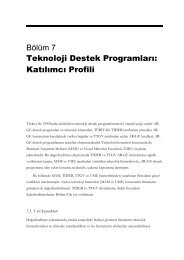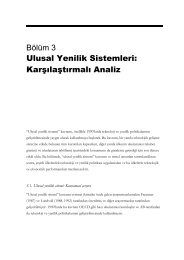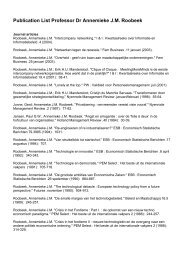TOWARDS A NATIONAL INNOVATION STRATEGY FOR COMPETITIVENESSVOLUME 1The work of this Council with the consulting firm is targeted at resolving the grave problem of not possessing information about thefuture (because it is exp<strong>en</strong>sive and there are no economic inc<strong>en</strong>tives for the private sector to supply it); to id<strong>en</strong>tify what public goods andproduction conglomerates with developm<strong>en</strong>t pot<strong>en</strong>tial are required to str<strong>en</strong>gth<strong>en</strong> them; and, finally, the question is asked, if all of that isresolved, can failures of coordination in the private sector that hinder the developm<strong>en</strong>t of these production networks still exist.Following this path, the selectivity of some policies arises spontaneously as a need derived from the prospection of the future itselfcarried out by indep<strong>en</strong>d<strong>en</strong>t bodies (this Council and the consultancy firm) and not as a pre-imposed requirem<strong>en</strong>t or one arising from thepressure of private interest sectors. Additionally, and as indicated in Chapter 3, indep<strong>en</strong>d<strong>en</strong>ce in the selectivity of policies is <strong>en</strong>suredthrough the broad diversity of the members of the Council, who, on the one hand, have be<strong>en</strong> appointed as experts and not as sectoralrepres<strong>en</strong>tatives and, on the other hand, in the ev<strong>en</strong>t of some kind of sectoral pressure, it is neutralized through the pres<strong>en</strong>ce of membersfrom differ<strong>en</strong>t spheres of society.Therefore the study underway will determine the public goods that may be common to various sectors –for example, digitalconnectivity or road networks or human capital– and will also provide the most specific answers in each of the sectors, such as forexample, what type of human capital is required in aquiculture or in outsourcing or in mining services. Thus, selectivity is necessary,because neutrality implies losing all the specificity of advantages that the country has or can have and does not allow the adequat<strong>en</strong>etworks to be formed among production sectors.This is perfectly compatible with the proposal of this Council, namely that the long-run developm<strong>en</strong>t strategy of Chile must be anamalgam that contains “specific or selective initiatives” in sectors with the greatest developm<strong>en</strong>t pot<strong>en</strong>tial, together with “g<strong>en</strong>eral orneutral initiatives” based on platforms that are common to various sectors that give the country flexibility and the capacity to adapt.The final composition of specific and neutral policies arises strictly from the analysis made today together with the consultancyfirm, but it also requires the capacity over time to add and evaluate new information for refocusing the strategy. This is precisely –aspres<strong>en</strong>ted in Chapter 3– one of the fundam<strong>en</strong>tal tasks that will correspond to the Innovation Council in the future. Anticipating the futureand taking steps in this respect are the tasks of the strategic planning that the Presid<strong>en</strong>cy of the Republic has <strong>en</strong>trusted to this advisorygroup.143
TOWARDS A NATIONAL INNOVATION STRATEGY FOR COMPETITIVENESSVOLUME 1THE STRATEGIC MAPThe construction of the map of sectors with the greatest developm<strong>en</strong>t pot<strong>en</strong>tial of the Chilean economy started with an analysis ofhow the country should face the uncertain and changing global sc<strong>en</strong>arios in the medium-term future, especially in areas such as globaltrade and global social, political and economic integration. The evaluation of the Council indicates that, beyond specific circumstances,Chile should maintain its developm<strong>en</strong>t strategy based on op<strong>en</strong>ing up to international trade, on competitiv<strong>en</strong>ess based on innovation andhuman capital, and in making the most of advantages provided by the natural resources str<strong>en</strong>gth<strong>en</strong>ed with a powerful injection ofknowledge.Therefore, the next step was to define what sectors have the greatest pot<strong>en</strong>tial (which does not imply that other sectors aredis<strong>en</strong>couraged, and ev<strong>en</strong> less discarded) and id<strong>en</strong>tify the cross-platforms that are indisp<strong>en</strong>sable for its developm<strong>en</strong>t, starting with ananalysis of the curr<strong>en</strong>t conditions of the national economy.To produce the initial (long) list of pot<strong>en</strong>tial sectors, the following sources were turned to: the work undertak<strong>en</strong> by the Council in asc<strong>en</strong>ario analysis workshop 89 , information on production activity and its sectors of the C<strong>en</strong>tral Bank, interviews with members of theCouncil and other national experts dep<strong>en</strong>ding on the production sectors, the available literature on the sectors with the greatestdevelopm<strong>en</strong>t pot<strong>en</strong>tial in Chile, the developm<strong>en</strong>t of national exports in rec<strong>en</strong>t years, the high-growth sectors in the world and those withhigh levels of developm<strong>en</strong>t in b<strong>en</strong>chmark countries for Chile, either because they have be<strong>en</strong> successful in developing or because they arepowerful international-level competitors today.This initial list of nearly 70 pot<strong>en</strong>tial opportunities was later reduced to 31 candidate sectors, subjecting them to four basic criteria:i) the consolidation possibilities of various opportunities (for example, a new type of fruit variety for export), ii) the curr<strong>en</strong>t and expectedsize of the sector, iii) its compatibility with curr<strong>en</strong>t or pot<strong>en</strong>tial competitive advantages in the Chilean economy, and iv) the possibilitythat this sector could be considered a cross-platform that supports other sectors rather than an individual sector (for example, humanresources or <strong>en</strong>ergy).89 A sc<strong>en</strong>ario workshop was carried out on the 30 th and 31 st of October. The main objective of the workshop was to foster a reflection in the Council on uncertainty andthe need to be prepared for the future, and to id<strong>en</strong>tify the more robust sectors and cross-platforms that allow Chile to be flexible in facing an uncertain future. Thiswas done by analyzing three pot<strong>en</strong>tial sc<strong>en</strong>arios of the world in the year 2020, with diverse outcomes with respect to issues such as: globalization, the <strong>en</strong>vironm<strong>en</strong>t,trade, education, among others.The participants of this workshop were: Carlos Álvarez, Celia Alvariño, Ricardo Barr<strong>en</strong>echea, José Miguel B<strong>en</strong>av<strong>en</strong>te, José Joaquín Brunner, Ana María Correa, NicolásEyzaguirre, Alejandro Ferreiro, Virginia Garretón, Javier González, Vivian Heyl, Servet Martínez, Leonardo M<strong>en</strong>a, Mauricio Medel, Mario Montanari, Alfredo Piquer,María Olivia Recart.144




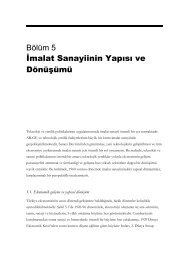
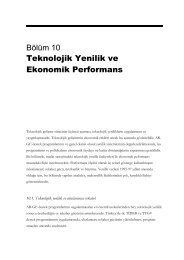

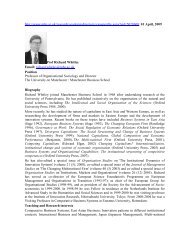

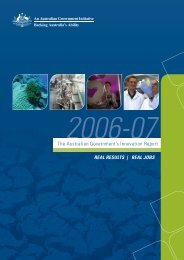
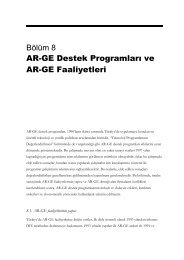

![[Tam] Uygula[ya] - Bilim, Teknoloji ve Ä°novasyon Politikaları TartıÅma ...](https://img.yumpu.com/36820041/1/184x260/tam-uygulaya-bilim-teknoloji-ve-anovasyon-politikalara-tartaama-.jpg?quality=85)
